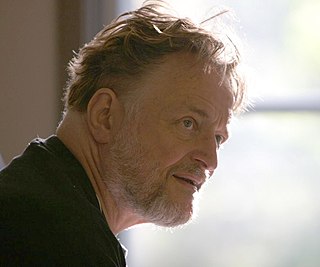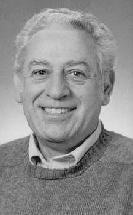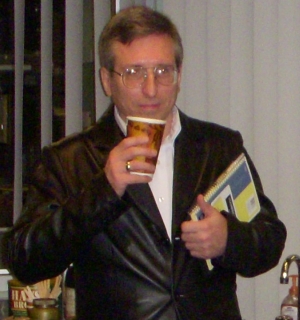Related Research Articles

Gregory John Chaitin is an Argentine-American mathematician and computer scientist. Beginning in the late 1960s, Chaitin made contributions to algorithmic information theory and metamathematics, in particular a computer-theoretic result equivalent to Gödel's incompleteness theorem. He is considered to be one of the founders of what is today known as algorithmic complexity together with Andrei Kolmogorov and Ray Solomonoff. Along with the works of e.g. Solomonoff, Kolmogorov, Martin-Löf, and Leonid Levin, algorithmic information theory became a foundational part of theoretical computer science, information theory, and mathematical logic. It is a common subject in several computer science curricula. Besides computer scientists, Chaitin's work draws attention of many philosophers and mathematicians to fundamental problems in mathematical creativity and digital philosophy.

John Horton Conway was an English mathematician active in the theory of finite groups, knot theory, number theory, combinatorial game theory and coding theory. He also made contributions to many branches of recreational mathematics, most notably the invention of the cellular automaton called the Game of Life.

Martin Gardner was an American popular mathematics and popular science writer with interests also encompassing scientific skepticism, micromagic, philosophy, religion, and literature – especially the writings of Lewis Carroll, L. Frank Baum, and G. K. Chesterton. He was also a leading authority on Lewis Carroll. The Annotated Alice, which incorporated the text of Carroll's two Alice books, was his most successful work and sold over a million copies. He had a lifelong interest in magic and illusion and in 1999, MAGIC magazine named him as one of the "100 Most Influential Magicians of the Twentieth Century". He was a prolific and versatile author, publishing more than 100 books.
Recreational mathematics is mathematics carried out for recreation (entertainment) rather than as a strictly research- and application-based professional activity or as a part of a student's formal education. Although it is not necessarily limited to being an endeavor for amateurs, many topics in this field require no knowledge of advanced mathematics. Recreational mathematics involves mathematical puzzles and games, often appealing to children and untrained adults and inspiring their further study of the subject.

Samuel Loyd was an American chess player, chess composer, puzzle author, and recreational mathematician. Loyd was born in Philadelphia but raised in New York City.

Robert Endre Tarjan is an American computer scientist and mathematician. He is the discoverer of several graph algorithms, including Tarjan's strongly connected components algorithm, and co-inventor of both splay trees and Fibonacci heaps. Tarjan is currently the James S. McDonnell Distinguished University Professor of Computer Science at Princeton University.
Alexander Keewatin Dewdney is a Canadian mathematician, computer scientist, author, filmmaker, and conspiracy theorist. Dewdney is the son of Canadian artist and author Selwyn Dewdney, and brother of poet Christopher Dewdney.

Ralph William Gosper Jr., known as Bill Gosper, is an American mathematician and programmer. Along with Richard Greenblatt, he may be considered to have founded the hacker community, and he holds a place of pride in the Lisp community. The Gosper curve and the Gosper's algorithm are named after him.

Elwyn Ralph Berlekamp was a professor of mathematics and computer science at the University of California, Berkeley. Berlekamp was widely known for his work in computer science, coding theory and combinatorial game theory.

Martin David Davis was an American mathematician and computer scientist who made significant contributions to the fields of computability theory and mathematical logic. He is best known for his work on Hilbert's tenth problem leading to the MRDP theorem. He also advanced the Post-Turing Model and co-developed the Davis–Putnam–Logemann–Loveland (DPLL) algorithm which is foundational for Boolean satisfiability solvers.

Erik D. Demaine is a professor of computer science at the Massachusetts Institute of Technology and a former child prodigy.
The Planiverse (ISBN 0-387-98916-1) is a novel by A. K. Dewdney, written in 1984.

David Breyer Singmaster was an American-British mathematician who was emeritus professor of mathematics at London South Bank University, England. He had a huge personal collection of mechanical puzzles and books of brain teasers. He was most famous for being an early adopter and enthusiastic promoter of the Rubik's Cube. His Notes on Rubik's "Magic Cube" which he began compiling in 1979 provided the first mathematical analysis of the Cube as well as providing one of the first published solutions. The book contained his cube notation which allowed the recording of Rubik's Cube moves, and which quickly became the standard.

Marcello Truzzi was a professor of sociology at New College of Florida and later at Eastern Michigan University, founding co-chairman of the Committee for the Scientific Investigation of Claims of the Paranormal (CSICOP), a founder of the Society for Scientific Exploration, and director for the Center for Scientific Anomalies Research.

Edward Taylor Pegg Jr. is an expert on mathematical puzzles and is a self-described recreational mathematician. He wrote an online puzzle column called Ed Pegg Jr.'s Math Games for the Mathematical Association of America during the years 2003–2007. His puzzles have also been used by Will Shortz on the puzzle segment of NPR's Weekend Edition Sunday. He was a fan of Martin Gardner and regularly participated in Gathering 4 Gardner conferences. In 2009 he teamed up with Tom M. Rodgers and Alan Schoen to edit two Gardner tribute books.
In a publishing career spanning 80 years (1930–2010), popular mathematics and science writer Martin Gardner (1914–2010) authored or edited over 100 books and countless articles, columns and reviews.
Gathering 4 Gardner (G4G) is an educational foundation and non-profit corporation devoted to preserving the legacy and spirit of prolific writer Martin Gardner. G4G organizes conferences where people who have been inspired by or have a strong personal connection to Martin Gardner can meet and celebrate his influence. These events explore ideas and developments in recreational mathematics, magic, illusion, puzzles, philosophy, and rationality, and foster creative work in all of these areas by enthusiasts of all ages. G4G also facilitates a related series of events called Celebration of Mind (CoM).
David Anthony Klarner was an American mathematician, author, and educator. He is known for his work in combinatorial enumeration, polyominoes, and box-packing.
Gary Antonick is an American journalist and recreational mathematician who for many years wrote a puzzle-based column called "Numberplay" for the New York Times.
Thomas Malin Rodgers was an Atlanta-based businessman and puzzle collector who is remembered as the originator of the Gathering 4 Gardner (G4G) educational foundation, first conceived in 1992. He co-founded G4G with magician and toy inventor Mark Setteducati and UC Berkeley professor Elwyn Berlekamp. Over the past three decades it hosted 14 biennial conferences for aficionados of the recreational mathematician and Scientific American columnist and writer Martin Gardner. Rodgers also edited 6 volumes of Martin Gardner tribute books, published by AK Peters. Rodgers' personal physical puzzle collection was legendary.
References
- ↑ The Steiner tree problem Authors: Frank Hwang, Dana Richards, Pawel Winter;North-Holland, 1992 ISBN 9780444890986
- ↑ Dana S Richards, George Mason University, National Science Foundation Association for Computing Machinery Digital Library
- 1 2 3 The Bibliography of Martin Gardner Dana Richards (editor), Donald E. Knuth (foreword), June, 2023, Pub: Stanford Center for the Study of Language and Information, ISBN 1684000327
- 1 2 3 Dana Richards GMU: Biosketch
- ↑ Dana Richards at the Mathematics Genealogy Project
- ↑ Awards National Science Foundation
- ↑ Books by Dana Richards ISBN.NET
- ↑ Dana S. Richards Computer Science Bibliography at DBLP
- ↑ Speaker: Dana Richards Brigham Young University, Mar 22nd 2018
- ↑ Martin Gardner: A Documentary by Dana Richards martin-gardner.org
- ↑ Richards, Dana (2018). Martin Gardner, Annotator G4G13, April 2018 - video
- ↑ The Legacy of Math Writer Martin Gardner NPR: All Things Considered , May 24, 2010
- ↑ Meeting of the Puzzlers: Hundreds get together to celebrate Martin Gardner and recreational math By Dana Richards, Scientific American, June 2014
- ↑ Math Games of Martin Gardner Still Spur Innovation By Colm Mulcahy and Dana Richards, Scientific American, October 2014
- ↑ Dana Richards (Editor), Martin Gardner (Author), The Colossal Book of Short Puzzles and Problems, W. W. Norton, ISBN 978-0-393-06114-7
- ↑ RETROSPECTIVE: Martin Gardner (1914–2010) Science, 09 July 2010, Vol. 329, Issue 5988, pp. 157
- ↑ Algorithmic Puzzles and Martin Gardner Dana Richards CoM Oct 2020, Jan 22, 2021
- ↑ Dear Martin Dear Marcello: Gardner and Truzzi on Skeptic WorldScientific, p. 10